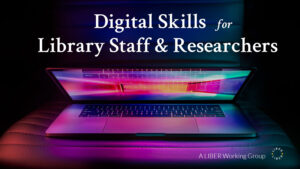
Today we’re pleased to introduce LIBER’s newest working group, focusing on Digital Skills for Library Staff & Researchers.
Group co-chairs Cecile Swiatek and Susanne Dalsgaard Krag explain what the group will be focusing on, and how you can get involved.
What will the group focus on?
There’s a growing skills gap being faced by libraries, their staff and customers (eg. researchers and faculty). Our world is changing rapidly. We have to deal with new topics like Open Science and the use of new techniques like text and data mining but we don’t always have the training or skills needed to keep up with this change.
This group will help by first sketching the existing landscape by identifying the biggest skills gaps and reviewing existing training material. After that, we’ll identify libraries who are leading change in this area and share best practices based on their work. We’ll also establish a ‘competence development plan’ for research library employees and write a ‘starter’s guide’ for Open Science-oriented library services.
How does it work in practice?
The group meets regularly to plan its work, and comes together at each LIBER Annual Conference. We’ll present our results at LIBER’s 2019 Annual Conference in Dublin, Ireland.
Can I get involved?
Of course! Anyone working in a LIBER library is welcome to join. We aim for our working groups to be as diverse as LIBER’s network of libraries, with candidates at all stages of their career and representing libraries in countries across Europe. Please send Cecile or Susanne an email if you are interested.
Can I share feedback even if I’m not in the group?
Feedback is always welcome. You can email us anytime and you are invited to join our upcoming workshop at LIBER 2019. This active and collaborative workshop will give you tools and invite you to think along on how to include Open Science digital skills in training programmes for librarians and researchers. The workshop is organised in collaboration with the Digital Humanities & Digital Cultural Heritage Working Group and the SSHOC project.
Related news articles